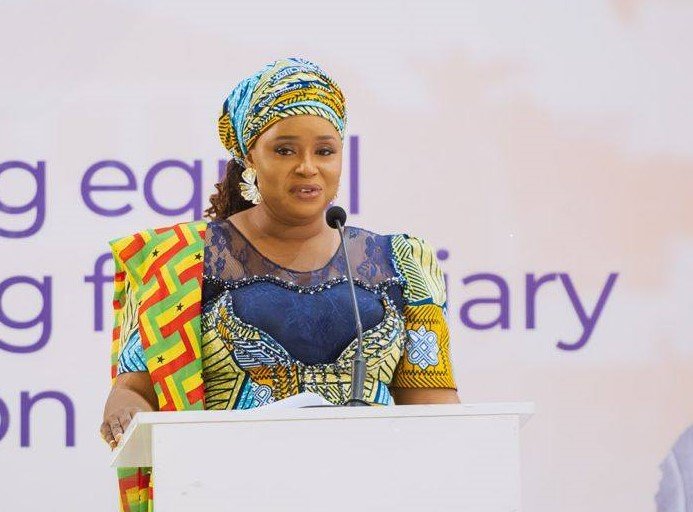The Government of Ghana has introduced sweeping reforms to Ghana’s tertiary education financing system, announcing the introduction of the Student Loan Plus and major increases in student loan support, and significant reductions in the cost of borrowing for students.
These interventions, implemented through the Students Loan Trust Fund (SLTF), follow a directive from President John Dramani Mahama as part of his administration’s commitment to expanding access, affordability, and equity in higher education under the flagship ‘No Fees, No Stress’ Initiative.
In a statement released on November 7, 2025, the SLTF described the reforms as transformative, highlighting that they are designed to remove financial barriers that have traditionally limited the aspirations of thousands of Ghanaian students.
The measures include the launch of a new full-fee loan product, substantial adjustments to the existing student loan scheme, a steep interest rate cut, and a redesigned disbursement process to ease access.
At the centre of the reforms is the introduction of the Student Loan Plus, a major component of the No Fees Stress Initiative. The new loan product provides full fee coverage and is paid directly to public tertiary institutions on behalf of students.
According to the SLTF, this approach guarantees uninterrupted academic progression for beneficiaries while eliminating the anxiety associated with delayed fee payments.

Loan Increment and Interest Cut
Beyond the Student Loan Plus, the SLTF announced that regular student loan amounts—disbursed directly to students- have been increased by 50 percent. Loan beneficiaries will now receive between GHC 2,250 and GHC 4,500 per academic year, depending on their category of support.
This upward review is expected to bring much-needed relief to continuing students struggling with rising costs of accommodation, study materials, food, and transportation.
Equally significant is the revised interest rate policy contained in the new package. The SLTF confirmed that the interest charged on student loans has been halved, reducing from 12 percent annual compound interest to 6 percent simple interest during the study period and the moratorium.
This marks one of the lowest student loan interest rates in Ghana’s recent history and is expected to reduce repayment burdens for young graduates seeking to enter the job market.

By shifting from compound to simple interest, the government ensures that borrowers incur far lower cumulative costs, reinforcing the policy objective of supporting students without trapping them in long-term financial distress.
Streamlined Application and Disbursement Process
The SLTF has also moved to simplify the loan application and disbursement process. Historically, student loan applicants were required to use E-zwich cards for processing and payment.
However, the Fund announced that this requirement has now been scrapped. Instead, GCB Bank accounts will be created automatically for all new applicants through the No Fees Stress portal, allowing seamless and more efficient disbursement of funds.
Dr. Saajida Shiraz, Chief Executive Officer of the SLTF, signed the statement, reaffirming the Fund’s commitment to driving equitable and inclusive access to higher education under the guidance of the Ministry of Education.
She noted that the reforms were inspired by the need to reshape Ghana’s tertiary financing landscape to meet the aspirations of the country’s youthful population.
“SLTF remains committed to enhancing equitable access to affordable and inclusive tertiary education in Ghana,” she said, signalling the Fund’s readiness to continue supporting innovation and reforms in student financing.

The reforms form part of a broader suite of educational interventions rolled out under President Mahama’s administration. In addition to covering the fees of all first-year students in public universities, the government has launched a Free Tertiary Education policy for Persons With Disabilities (PWDs).
This program guarantees full fee coverage for its beneficiaries across public tertiary institutions, marking an important step in inclusive education and social protection.
The announcement is welcoming for students across the education sector, as it is a timely response to the financial pressures confronting students and families. Rising tuition charges, increasing cost of living, and limited scholarship opportunities have all contributed to heightened demand for accessible loan schemes.
The new initiatives are therefore expected to ease financial strain while supporting Ghana’s long-term goal of expanding tertiary education enrolment. The SLTF’s latest announcement marks one of the most decisive steps in recent years to reshape Ghana’s tertiary education financing framework.
With expanded loan amounts, reduced interest rates, streamlined processes, and strengthened support for disadvantaged groups, the reforms signal a renewed commitment to creating equal educational opportunities for all students.
READ ALSO: Ghana Shifts from Ambition to Action in Energy Transition – Armah-Kofi Buah Tells COP30






















